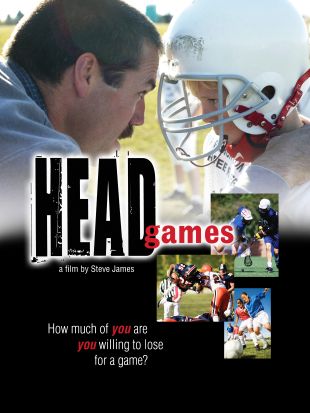
There are few fly-on-the-wall sports documentaries as revered as Steve James' 1994 film Hoop Dreams, which followed the lives of two high-school basketball phenoms in Chicago as they tried to make their way to the NBA. James' first feature documentary to revisit the world of sports, Head Games, owes more to Michael Moore's advocacy work than D.A. Pennebaker's cinéma vérité style, but in its own way, it's just as powerful a portrait of what sports mean to the people who play them.
The movie opens with a portrait of former college-football player, ex-professional wrestler, and Harvard graduate Chris Nowinski, who, after suffering a concussion while performing in the WWE, experienced long-term headaches and other physical ailments. He began researching the topic of concussions and concussion treatment in the NFL, eventually publishing a book on the subject. That tome, which gives this movie its title, caught the attention of a New York Times reporter who wrote a front-page story about it, prompting the NFL to address the issue publically for the first time in its history.

This segment of James' film has a thrilling David-vs.-Goliath element to it, especially when we see members of Congress compare the NFL burying information about the health risks of their games to tobacco companies hiding the severe adverse effects of cigarettes from their customers for decades. However, James isn't interested in only this aspect of the story. He goes on to profile a high-school soccer star who has already suffered multiple concussions thanks to her aggressive style, a three-time Olympic soccer medalist who walked away from the game -- much to the consternation and disapproval of her parents -- because of ongoing head trauma, and Keith Primeau, a former NHL player who was forced into retirement because team doctors would no longer clear him to play after his fourth major diagnosed concussion.
Primeau's son, himself a young hockey player, gets his fair share of screen time. He declares that he doesn't want to hear his dad talk about what can happen after suffering a blow to the noggin, and that he liked getting into the few hockey fights he's been in so far. Near the end of the film, James captures Keith talking about how even though he knows the risks, he feels like he has to let his children make their own decisions. This brief confession is probably the deepest moment in the whole movie, because suddenly we're not talking about corporate interests selling risky behavior to the American public, but very personal reflections on what it means to be a parent. How do we live with the risks we see our children take, even when we know they might not be fully aware of what they're doing? This theme is underlined during conversations with another doctor who has studied this issue closely, but still allows her son to play high-school hockey because he loves it and she loves watching him play.
She is far from the only medical expert interviewed over the course of Head Games, and nearly all of them are frightening in their assessments and explanations of how dangerous, long-term, and extensive the injuries suffered from multiple concussions can become. This is a documentary that will teach you just enough about the anatomy of the brain that you'll probably never be able to watch football, a hockey fight, or boxing the same way again.
Even though James obviously intends to educate viewers about this subject, he doesn't necessarily have a point of view when it comes to what should be done about it. The film certainly never advocates for football to end or for parents to keep their kids from playing soccer. However, he makes clear the unimaginable physical and emotional pain suffered by those who may not have been aware of exactly how dangerous these popular activities can become.
James frames his film with footage of a peewee football game, and at first, the seven- and eight-year-olds in helmets and pads look adorable. But by the end of the movie, that same image triggers feelings of fear and dread, because if the information in Head Games doesn't become common knowledge, every single one of them is ignorantly risking their memory, their health, and their lives.
